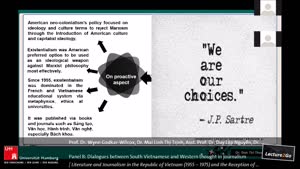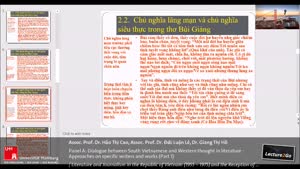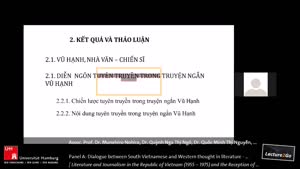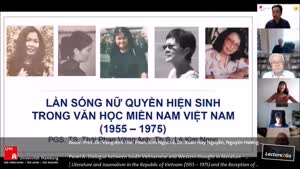Panel B: Dialogues between South Vietnamese and Western thought in journalism - Prof. Dr. Wynn Gadkar-Wilcox, Dr. Mai Linh Thị Trịnh, Asst. Prof. Dr. Duy Lập Nguyễn, Dr. Thảo Thị Trần, Prof. Dr. Ngọc Thạch Đinh, Dr. Thùy Dung Trương, Nguyên Long Lê, Ánh Dương Đoàn - University of Hamburg
- Lecture2Go
- Catalog
- F.5 - Geisteswissenschaften
- Asien-Afrika-Institut
- Literature and Journalism in the Republic of Vietnam (1955 – 1975) and the Reception of Western Thought
Catalog
Panel B: Dialogues between South Vietnamese and Western thought in journalism
- Prof. Dr. Wynn Gadkar-Wilcox: Continental philosophy and Buddhism in the journal Tư Tưởng (Thought), 1967 – 1975
- Dr. Trịnh Thị Mai Linh: Journalism activity of the Chinese in Southern Vietnam from history perspective (from 1955 to 1975)
- Asst. Prof. Dr. Nguyễn Duy Lập: Vietnamese personalism: The communitarian humanism of the early South Vietnamese state
- Dr. Trần Thị Thảo and Prof. Dr. Đinh Ngọc Thạch: Vietnamese intellectuals’ perspectives on Jean-Paul Sartre’s existential philosophy in South Vietnam during the period 1954 – 1975
- Dr. Trương Thùy Dung: An unprejudiced education and the development of literature in South Vietnam in 1954 – 1975
- Lê Nguyên Long and Đoàn Ánh Dương: Ý thức hệ, thế hệ và kiến tạo văn hóa mới: Cách tân văn học của nhóm Sáng tạo và Thanh Tâm Tuyền ở Việt Nam (1954-1975)
---
The Republic of Vietnam (1955-75) had a tragical historical fate. Intellectually, however, it was a period full of various influences and exiting encounters between the cultures of Vietnam and the world, especially between East and West. Vietnamese intellectuals, trained in modern schools and universities, searched for their identity in a world full of promises and challenges. They were looking for reasons of societal instability and for a meaning of their existence. This living laboratory of ideas was closed after 1975. Many authors emigrated or were condemned to silence. In recent years, Vietnamese intellectuals both within and outside of the country are interested again in these debates and influences. The conference hopes to shed light on the social and cultural dynamics and complexities of South Vietnam.
This one-day conference examines how South Vietnam’s literary and journalistic authors perceived and were potentially influenced by thought generated in the West. This includes, but is not limited to, phenomenology, hermeneutics, existentialism, romanticism, idealism, essentialism, Marxism, structuralism, and psychoanalytic criticism. Presentations will discuss the complex dynamics of the reception in South Vietnam of western thinkers and writers such as Albert Camus, André Gide, JeanPaul Sartre, Fyodor Mikhailovich Dostoevsky, Martin Heidegger, Henry Miller, and John Steinbeck.
The conference emphasizes the dynamism and diversity of Western thought in individual literary texts and authors as well as among texts of different authors and different texts of the same author. Western thought migrated to Vietnam also in
different historical periods, and the same ideas were perceived in different ways.




